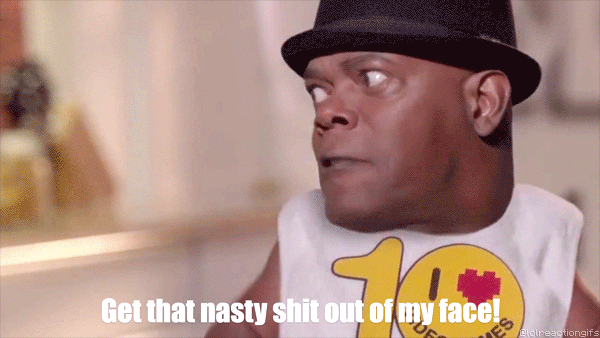The summer takes its toll on my sanity. Time, though more abundant, disappears in a blink. The kids are always there. Staring. Demanding food and entertainment. But as much as I’d like to blame the children for all that ails me, including this cough I just can’t shake… there’s something else that’s been bothering me, like a t-shirt with a scratchy tag.
It’s about Ghostbusters.
Yes, again, goddammit. I’m stuck in a recursive loop.

For my next trick I’ll write about Ghostbusters.
I’ve written about Ghostbusters (1984) a few times. (Here as a part of mental therapy and here as a thinkpiece about time passage and perception.) I’ve even written about the trailer and misplaced Internet rage for Ghostbusters (2016). I spend a lot of time thinking about Ghostbusters. Next I’ll discuss how amazing it is that Kate McKinnon’s hair in Ghostbusters (2016) is an homage to Egon’s hair in The Real Ghostbusters. 3000 words, minimum. It’s come to my attention that the four times I saw Ghostbusters in the theater in 1984 may have played too formative a role in my childhood development.

But today, I’m going to pen a bl-g post that shouldn’t need to be written. Even now it feels like wasted breath… or more accurately wasted key strokes, but the latter sounds far less dramatic. Like writing about how the sky is f’ing blue.
I’m writing this to remind you that Ghostbusters (1984) is actually that good.
(From now on I will liberally substitute “1984” for Ghostbusters (1984) and “2016” for Ghostbusters (2016) to save on those wasted key strokes.)
I’m looking at you, asshole on Letterboxd who watched Ghostbusters (1984) for the first time and said “If this was your childhood, there wasn’t anything to ruin anyway.” That guy wasn’t alone; he was just the biggest asshole. Just scan the latest first-time watches of 1984 on Letterboxd and you’ll find a glut of viewers using similarly incendiary language. I’ve kept a sideways eye on these ongoing first-watch developments (which, I’ll admit is masochism on par with reading the comments on Huffington Post) when I should have run screaming from this activity like Ray Stantz from the New York Public Library.

These comments exist as a hyperbolic reaction to the “you’re ruining my childhood” idiots. (Disclaimer: I do not condone the “ruining my childhood” behavior either.) But what gives you the right to fire back at me, the innocent bystander championing both 1984 and 2016, to claim my childhood experience was the rippled Charmin to your mindless Internet dump. Don’t unleash your cynical me-first derision unless you have something constructive to say — the one little caveat here is that your cynical me-first derision, by nature, offers nothing constructive whatsoever and is really just a plea for attention.
The Internet Troll Quarantine
I compartmentalized these comments in my “Internet Troll Quarantine,” which is like sending the lepers to Crete, except in my head and less sunny. I could manage the troll queue, but then I read the following comment in the New York Times, courtesy of one of my favorite film critics, A.O. Scott:
I have to say it makes me very happy when big commercial movies provoke serious political arguments, but before we dive into that particular fray I want to make a few statements I trust will not be terribly controversial. 1) Kate McKinnon should be in every movie from now on. 2) The new “Ghostbusters” is like the old “Ghostbusters” in that it gives comic performers who gained popularity on television and in more provocative projects a chance to widen their appeal and increase their earning potential with a mainstream action-comedy. 3) The old “Ghostbusters” isn’t that great to begin with.
Yes. Mm-hmm. Kate McKinnon should be in every movie. And totally. The new Ghostbusters is in many ways like the old Ghostbusters. Right on, A.O. BUT HOLD THE PHONE. “The old Ghostbusters isn’t that great to begin with”? You’ve been a lighthouse of reason and sanity in these dark and foggy cinematic times, A.O. Scott. And now you’re shattering one of the few unassailable truths in my cinematic worldview? Dogs and cats living together. Mass hysteria.
Sky is blue. Grass is green. Rain is wet. Ghostbusters (1984) is great. No? What’s with this sudden reassessment?

Let’s first get a few things straight. I’ll speak plainly so not to confuse anyone. I’ve always been in favor of reviving the Ghostbusters franchise. New actors, old actors. Whatever. The franchise for various reasons was never allowed to reach maturation. The choice to cast all women was a logical and somewhat inspired twist on the formula. Casting Kate McKinnon was the best decision anyone in Hollywood has made this year.
I’m not here to offer a point-by-point comparison between 1984 and 2016. They are different entities. But I will highlight one specific failure of 2016 to prove a point.
Now to use Alton Brown to make a random point about screenwriting
The original Ghostbusters screenplay by Dan Aykroyd and Harold Ramis has been heralded as one of the finest examples of Hollywood screenwriting. Every scene contributes to the film’s forward momentum. I argue that not one scene is wasted. But how would I define a wasted scene? A scene that exists for one reason alone. Alton Brown would call them unitaskers and explain why unitaskers have no place in his kitchen. Unitaskers are scenes that hit narrative beats without conflict or humor… or vice versa. Unitaskers are exposition. Find me a scene in 1984 that doesn’t function on multiple levels. A good movie minimizes the use of these one-purpose scenes, but sometimes they’re inescapable. Great movies avoid them altogether.

1984 also benefited from a largely extinct collaborate creative process. The screenplay as blueprint allowed freedom for improvisation. Jason Reitman, son of Ghostbusters director Ivan Reitman, confirmed that most, if not all, of Bill Murray’s dialogue was improvised. Outside of Adam McKay, who allows his actors that kind of freedom? To take this one step further, what studio would allow such a thing on the set of a big budget film? The improvisation works within the framework of the script due to the focused momentum hurtling toward a satisfying, logical finale. Modern moviemaking has been castrated by the big business of making movies. Mass appeal. Managed and massaged for global consumption.
It is precisely this satisfying finale that sets 1984 apart from other frivolous blockbusters and Ghostbusters (2016) in particular. 2016 meanders toward its end. It dwells in scenes that function only as comedy with no forward push. I’m thinking specifically at the moment of the two scenes of back alley gadget trials. 1984 demonstrated proton packs, traps and other gizmos on the job, in scenes that furthered the narrative.

“It just occurred to me we really haven’t had a completely successful test of this equipment,” Ray says as he, Egon and Venkman ride the elevator up. Egon switches on Ray’s pack and backs away. While the gadget porn scenes in 2016 offer a fun detour, they contribute nothing to the narrative progress. They’re throwaway bits of comedy.
These wasted unitaskers likely contribute to the long, overblown effects-laden finale (an all too common pitfall of modern blockbuster cinema). Distract with effects and noise and maybe the audience won’t notice that we haven’t earned this ending. The new Ghostbusters resolve their respective paranormal crisis by using a vaguely established nuclear device on Ecto-1. Toss the hearse in the pit and blow it up. Bingo bango. This, of course, functions parallel to “crossing the streams.” Each is treated as a brash, irresponsible last-ditch gesture that threatens humanity should it fail. 1984, however, established the perils of “crossing the streams” way back at the beginning of the film when busting their first spook in the hotel ballroom.
“There’s something very important I forgot to tell you.”
“What?”
“Don’t cross the streams.”
Thus, when facing Gozer and the team of paranormal exterminators has run out of available options to close the dimensional portal, “total protonic reversal” has already been established. The audience recognizes the logic, feels as if they too could have come to the same conclusion. The most effective resolutions are the ones that the audience *would* have expected if they weren’t too busy being entertained. Meanwhile when 2016 tosses the Ecto-1 into the abyss and lights the radioactive fuse, this choice comes from nowhere.
The screenplay in Ghostbusters (2016) completely breaks down during the final third of the film. This isn’t an isolated phenomenon. I don’t mean to single out Ghostbusters (2016) as some sort of anomaly. How many movies have you seen in the last year alone that fall apart while trying to conclude a narrative? It’s a screenwriting failure that can be traced to the scenic level. Plant the seeds for the ending in Act One or early in Act Two. Harvest in the finale. When that doesn’t happen, however, the quick fix is misdirection through effects and noise. I’m oversimplifying the screenwriting process, but this lesson was cribbed directly from the lecture I received on the second day of my undergraduate Screenwriting class.
I forgive you A.O. Scott, but I won’t forgive the nostalgia-shaming trolls.
Too many writers. Too many ideas. Too much interference from studios. There are many reasons that even great scripts fail between conception and reaching the screen. If it were easy, every movie would at least portray a sense of narrative competency and Ghostbusters (1984) wouldn’t be a quintessential piece of Hollywood escapist filmmaking. It’s actually 1984 that remains the anomaly. And yes, A.O. Scott, it is that good. I’ll let your momentarily lapse in judgment slide.
Ghostbusters is also an inextricable part of my childhood. It is actually perhaps my most vibrant slice of personal nostalgia. Remakes, reboots, spinoffs cannot change that — but don’t you dare troll 1984 by casting unwarranted derision because you want to set yourself apart, to elevate your opinion above mine by using my nostalgia against me.

I’ll admit that nostalgia plays a role in my affection for Ghostbusters (1984), but appreciating Ghostbusters does not require nostalgia. Sure, some of the matte effects look dated, Gozer’s dog puppets are comically rooted to the floor, and maybe the gender politics seem slightly questionable… but don’t you dare doubt the reasons that 1984 remains excellent entertainment. Nostalgia is not a dirty word. It’s also a legitimate reason that someone can enjoy a movie. No one’s frame of reference is less important than yours. If you care to read more, I wrote about Nostalgia and moviewatching in my #Bond_age_ essay on Moonraker.
Oh and a few more truths.
The 1980’s f’ing ruled and Ghostbusters remains one of the best things ever. If you disagree, I wouldn’t open my fridge tonight if I were you. Someone might get the munchies.


